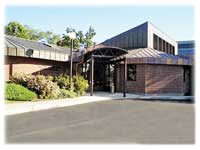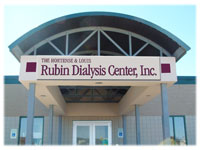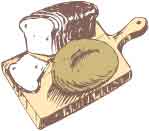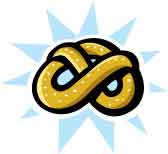
This site is dedicated to providing you with up to date
news and events, plus information about our facilities.
Please bookmark our site now for future reference.








Ingredients
3 eggs
2 cups flour
1 1/2 cups sugar
1/4 teaspoon baking powder
1 cup applesauce
1 teaspoon baking soda
2 cups unpeeled zucchini, shredded
1 teaspoon cinnamon
1 teaspoon vanilla
1/2 teaspoon ginger
1 cup unsalted chopped nuts
Beat eggs. Mix sugar, applesauce, zucchini and vanilla into eggs. Sift dry ingredients together and add to mixture. Pour into a loaf pan and bake at 375o F for 1 hour. Cut into 16 slices.
Nutritional Contents: One slice equals 2 starch, 1 low potassium vegetable and 1 fat and contains: Calories - 202, Carbohydrates - 34, Protein - 3.7, Fat - 6, Sodium - 69, Potassium - 110, Phosphorus - 62.
Soft Pretzels

Ingredients
1 package dry yeast
2 Cups flour
3/4 cup warm water
2 tablespoons milk
1 tablespoon sugar
1 tablespoons sesame seeds
In large bowl, mix yeast and warm water. Mix in sugar. Beat in flour. Knead in bowl until smooth, about 10 minutes. Place dough on a floured board and divide into 12 equal pieces. Roll each piece into a rope approx. 12 inches long. Shape each rope into a pretzel. Place on a greased baking sheet, brush with milk and sprinkle with sesame seeds. Bake at 425o F for 12-15 minutes or until browned. Cool on a rack and serve.
Nutritional Contents: One pretzel equals one starch and contains: Calories - 86, Carbohydrates - 16, Protein - 3, Fat - 1, Sodium - 3, Potassium - 61, Phosphorus - 48.
Herbs Today
Herbal medicine use continues to grow in the United States as more and more people seek greater control over their health care. More than 29,000 products are now available to consumers and an average of 1000 new products are added yearly.
Supplement manufacturers do not need to provide substantiation of health claims for their products. Legally herbal supplements are dietary supplements, but as far as their action on the body, they act as drugs.. Medicinal herbs are not tested for their safety or effectiveness and are not regulated for purity or potency. Little is known about their effectiveness, dosage, side effects and interaction with prescribed medications.
Herbs are a complex mix of chemicals with one or more active ingredient. Herbs should be thought of as drugs---only less purified and more diluted.
Long-term studies regarding herbs overall health benefits leaves a lot to the unknown.
A piece of the unknown includes how herbs are excreted by the body, this becomes a major concern for the renal patient population. Use of herbal medicines by the renal patient and transplant patient is potentially dangerous.
Some herb supplements such as Juniper berries, Periwinkle and Chaparral are directly toxic to the kidney.
Other supplements such as: aloe, senna or cascara used regularly can accumulate in renal tissue and cause fluid and electrolyte imbalance and may alter absorption of some drugs.
Goldenrod, parsley and juniper berries have diuretic properties and can alter electrolyte balance and cause dehydration.
Licorice root may cause sodium and water retention and excessive potassium losses.
Garlic, gingko biloba, ginseng, ginger and feverfew contain natural coumarins which may prolong bleeding time or interact with anticoagulants. This can have a serious impact on dialysis patients and use of heparin.
St. John's Wart is not recommended for patients with renal failure or organ transplant as it can interfere with medications and put patients at risk for acute rejection. It also should not be taken with other anti-depressants.
Laxatives containing anthraquionoes decrease absorption of other medications when takentogether. They also interfere with potassium sparing diuretics and increases the toxicity of cardiac medications.
There are many other herbs that should be avoided such as sandalwood, lovage root, watercress herb, horseradish root etc....
Herbal medicines have been found to contain heavy metals, undeclared synthetic drugs, microbial toxins and toxic botanicals.
Bottom line is herbal supplements can be extremely dangerous to anyone with a chronic illness, transplanted organ, HIV, diabetes, rheumatoid arthritis or lupus.
Renal patients are particularly at risk for drug interaction and toxicity.
Be sure to notify your Physician if you are taking any herbal supplement.









webmaster@lergraphics.com